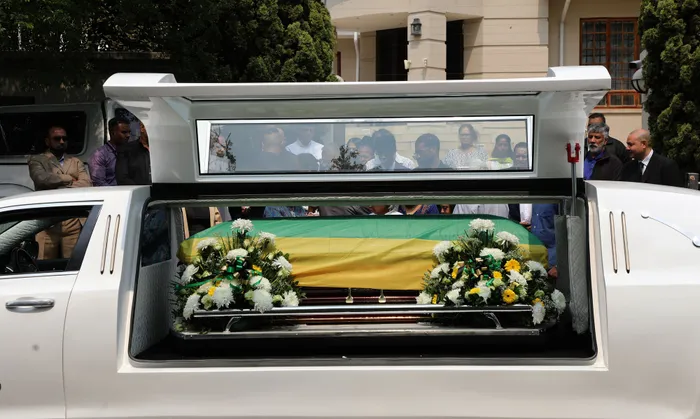Pravin Gordhan’s legacy keeps the lights on, says Neeshan Balton of Ahmed Kathrada Foundation

The body of the late former minister Pravin Gordhan leaving home in Groenkloof, east of Pretoria, after the viewing. Picture: Oupa Mokoena / Independent Newspapers
The body of former Cabinet minister Pravin Gordhan was on Tuesday brought to his Pretoria East home for the last time before memorial services in Johannesburg and KwaZulu-Natal, where he will be laid to rest.
IOL reported that Gordhan died on September 13, at the age of 75, following a period of illness. He had served as Minister of Finance from 2009 until 2014 and again from 2015 until 2017.
He also served as Minister of Cooperative Governance and Traditional Affairs from 2014 until 2015, and as Minister of Public Enterprises from February 2018 until his March 2024 announcement of planned retirement.
Neeshan Balton, executive director of Ahmed Kathrada Foundation said in all the different areas where Gordhan served, the former minister strived for excellence and part of his hard work is what South Africans are enjoying today.
“At public enterprises, I think there is a lot more work to be done to understand the depth of the crisis he found there. The difficulties of turning them (institutions) around but today the lights are on. People don’t think Pravin had a major role in terms of keeping these lights on today whereas the facts will show that he did,” Balton spoke to broadcaster Newzroom Afrika outside the Gordhan residence in the suburb of Groenkloof, Pretoria.
“Transnet is a bit more stable today. Many of the parastatals under that portfolio of public enterprises, I think they have turned around. Pravin did say State capture was deeply rooted in those institutions and a lot more needs to be done to root it out completely, and there is still unfinished work.”
President Cyril Ramaphosa has declared a Special Official Funeral, Category 2 which will take place at the Durban International Convention Centre (ICC) on Thursday.
The Presidency said the funeral would encompass ceremonial elements performed by the South African Police Service (SAPS).

Balton said the lessons from Gordhan’s life of activism should encourage current crop of leaders to prioritise the interest of the people, and for more and more community members to get involved in governance.
“Do the right thing at all times. Do it for the interest of people, make government work for the interest of people. Expose corruption, expose malpractices, demand the best from public services for the people of South Africa – that is what I think he would have wanted,” said Balton.
“More importantly, (he) would have wanted people to be actively involved in this democracy, not to sit by and only complain on social, but to hold leaders accountable for all that they need to be held accountable for.”
He said it is difficult to single out a specific area where Gordhan served in government and present it as being worthy of greater attention than the others areas.
“I think in each of those (institutions) he played a particular role – stabilising SARS, transforming it into a world class institution, coming into minister of finance at a time where there was a world wide recession, preventing South Africa from suffering the worst effects of the global meltdown, local government was a short stint but I think had he been allowed to stay there, we wouldn’t have the crisis that we have today of collapsing municipalities left, right and centre,” said Balton.

Gordhan was appointed as commissioner of the South African Revenue Service in 1999, after a period as deputy commissioner.
The National Flag is being flown at half-mast from Saturday morning, until the evening of the funeral.
IOL
Related Topics: